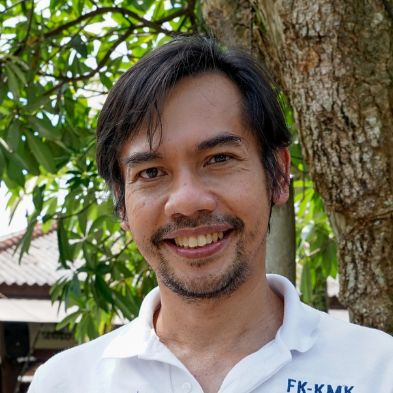
Anis Fuad
Researcher
Department of Public Health, Faculty of Medicine, Universitas Gadjah Mada
Overview
Anis is a teaching staff and researcher at the Faculty of Medicine, Public Health and Nursing, Universitas Gadjah Mada University in Yogyakarta, Indonesia. As a researcher, he is also affiliated with the Center for Tropical Medicine and the Center for Health Policy and Management (PKMK), FKKMK UGM. He actively involved in digital health communities and development in Indonesia. Anis is also a Governing Committee member of AeHIN (Asia eHealth Information Network). His expertise spans bibliometrics, social network analysis, spatial epidemiology, and health information systems. Anis has contributed to numerous consultancy projects and scientific publications.
Education & Training
•
Master in Medical Informatics and Communication Technology. Faculté de Médecine Broussais Hôtel-Dieu,Université Paris VI. (2002).
•
Bachelor in Medicine Faculty of Medicine Universitas Gadjah Mada. (1998).
PROFESSIONAL EXPERIENCE
•
2016-now Head of Ehealth Division, Center for Health Policy and Management, Faculty of Medicine, Public Health and Nursing, Universitas Gadjah Mada
•
2021-2022 Coordinator of E-Malaria Regulatory Sandbox, joint research UGM-Ministry of Health
•
2023 Principal Investigator for the Development of Metadata for SatuSehat supported by the WHO Indonesia Country Office
Selected Publications
•
Ahmad, R. A., Imron, M. A., Ramadona, A. L., Lathifah, N., Azzahra, F., Widyastuti, K., & Fuad, A. (2023). Modeling social interaction and metapopulation mobility of the COVID-19 pandemic in main cities of highly populated Java Island, Indonesia: An agent-based modeling approach. Frontiers in Ecology and Evolution, 10, 958651.
•
Putri, A. F. A. P., Marsetyo, F. A., Atmaja, U. S. K., & Fuad, A. (2022). Mental Health Teleconsultation Patterns on the Most Popular mHealth Platforms in Indonesia. Stud Health Technol Inform, 246-248.
•
Andriani, S. P., Adhyanacarira, P., Fuad, A., & Pertiwi, A. A. P. (2022). Comparison of Non-AI and AI-Enabled M-Health Platforms for COVID-19 Self Screening in Indonesia. Advances in Informatics, Management and Technology in Healthcare, 295, 226.
Empowering Health Sector in Post Pandemic Era: The Role of Digital Transformation Office (DTO) at the Indonesian Ministry of Health
Abstract
In the wake of the global pandemic, Indonesia's health sector underwent significant transformations, catalyzed by dynamic leadership and the establishment of the Digital Transformation Office (DTO) within the Indonesian Ministry of Health. This pivotal development has not only reshaped the landscape of healthcare in the archipelago but also positioned Indonesia as a key player in the realm of digital health transformation.
The DTO, as the vanguard of Indonesia's digital health journey, stands as a testament to the nation's commitment to enhancing health and well-being through accelerated digital transformation. This abstract delves into the multifaceted aspects of Indonesia's experience, offering insights into key factors that propel medical information interoperability and drive broader digital transformation.
The DTO, with its robust structure, strategic allocation of resources, and a portfolio of dynamic activities plays a pivotal role in orchestrating the development of a comprehensive digital health transformation blueprint, aligning the diverse stakeholders towards a unified vision of an interconnected and technologically advanced healthcare ecosystem.
A critical aspect of this journey involves the establishment of standards and regulations, epitomized by the SatuSehat platform. This platform serves as a linchpin for promoting interoperability, ensuring seamless communication and integration across the diverse spectrum of healthcare providers. The standardization efforts not only facilitate information exchange but also lay the groundwork for a cohesive and efficient digital health infrastructure.
Furthermore, Indonesia's approach to digital transformation extends beyond the confines of the government, embracing a collaborative model that intertwines the industry, civil organizations, and government agencies. A mechanism employed to ensure close collaborative partnerships, emphasizing the symbiotic relationship that is pivotal for the success of digital transformation endeavors.
A noteworthy initiative in this regard is the establishment of a regulatory sandbox, a controlled environment that facilitates experimentation and learning while safeguarding against potential risks. This innovative approach enables the health sector to adapt to disruptive technologies, such as telehealth, by fostering an iterative process of regulation development. The DTO's regulatory sandbox serves as a fertile ground for testing new models, learning from experiences, and shaping policies that balance innovation with safety.
In conclusion, Indonesia's journey towards enhanced health and well-being through digital transformation, spearheaded by the Digital Transformation Office, is a testament to the nation's resilience and adaptability. By addressing key factors in medical information interoperability and fostering collaborative partnerships, Indonesia started in leveraging technology for the betterment of healthcare. The insights gleaned from Indonesia's experience hold valuable lessons for the global community as we collectively navigate the evolving landscape of digital health.